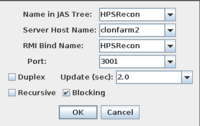Difference between revisions of "Online Recon - Expert"
| Line 3: | Line 3: | ||
The core HPS java software builds for online, multi-threaded reconstruction live in <tt>~hpsrun/online_recon</tt> and were installed using the [https://confluence.slac.stanford.edu/display/hpsg/Online+Reconstruction+Tools instructions on confluence]. We may decide the hps-java installation there should be a symlink to a standard one elsewhere, but note it requires an extra installation step and (currently) a non-master git branch. If the tomcat servlet needs updating, it will need to be rebuilt and redpolyed. | The core HPS java software builds for online, multi-threaded reconstruction live in <tt>~hpsrun/online_recon</tt> and were installed using the [https://confluence.slac.stanford.edu/display/hpsg/Online+Reconstruction+Tools instructions on confluence]. We may decide the hps-java installation there should be a symlink to a standard one elsewhere, but note it requires an extra installation step and (currently) a non-master git branch. If the tomcat servlet needs updating, it will need to be rebuilt and redpolyed. | ||
| − | Everything operates as user=hpsrun and startup originates in <tt>$EPICS/apps/iocBoot/procServ.conf</tt>. There are 4 components, each of which can be connected to in telnet sessions: | + | Everything operates as user=hpsrun and startup originates in <tt>$EPICS/apps/iocBoot/procServ.conf</tt>. There are 4 components, started sequentially, each of which can be connected to in telnet sessions: |
| − | + | # <tt>softioc_console dqm_et</tt> | |
| − | + | #* just an ET ring, offline only | |
| − | + | # <tt>softioc_console dqm_evio2et</tt> | |
| − | + | #* pipes an EVIO file to the ET ring, offline only | |
| − | + | # <tt>softioc_console dqm_server</tt> | |
| − | + | #* receives instructions from the client below | |
| − | + | # <tt>softioc_console dqm_client</tt> | |
| − | + | #* instructs the server on parameters, e.g. #threads, steering file | |
Once connected, individual components can be killed, paused, restarted, using the <tt>ctrl-X/T</tt> sequences (which is printed when you connect). To disconnect from a telnet session, <tt>ctrl-]</tt> and then type <tt>quit</tt>. | Once connected, individual components can be killed, paused, restarted, using the <tt>ctrl-X/T</tt> sequences (which is printed when you connect). To disconnect from a telnet session, <tt>ctrl-]</tt> and then type <tt>quit</tt>. | ||
Revision as of 14:45, 3 August 2021
Servers
The core HPS java software builds for online, multi-threaded reconstruction live in ~hpsrun/online_recon and were installed using the instructions on confluence. We may decide the hps-java installation there should be a symlink to a standard one elsewhere, but note it requires an extra installation step and (currently) a non-master git branch. If the tomcat servlet needs updating, it will need to be rebuilt and redpolyed.
Everything operates as user=hpsrun and startup originates in $EPICS/apps/iocBoot/procServ.conf. There are 4 components, started sequentially, each of which can be connected to in telnet sessions:
- softioc_console dqm_et
- just an ET ring, offline only
- softioc_console dqm_evio2et
- pipes an EVIO file to the ET ring, offline only
- softioc_console dqm_server
- receives instructions from the client below
- softioc_console dqm_client
- instructs the server on parameters, e.g. #threads, steering file
Once connected, individual components can be killed, paused, restarted, using the ctrl-X/T sequences (which is printed when you connect). To disconnect from a telnet session, ctrl-] and then type quit.
Configuration files for all are currently in their startup directory $EPICS/apps/iocBoot/dqm and require
A full teardown and restart of all components, including the tomcat server, is in user=hpsrun's $PATH:
- hps-dqm-restart.sh
TODO
- Can the webapp be modified to automatically reload the plots periodically, without the user manually refreshing the web page? This will be important to give users feedback that things are working (and no one wants to have to reload the page). 1 Hz would be great, every few seconds would be good enough.
- The stop/start functionality in the server appears maybe unreliable, and the tomcat servlet also appears to need to be restarted if the recon server is restarted. These things will need to be done in order to zero the histograms, which will be every run and every time beam is away for a significant amount of time. Meanwhile, a script to do a full teardown and restart is available, but it takes many seconds to ensure things are started with appropriate, intermediate delays.
Clients
Both should work from any clon machine:
- jas3-->Tools-->Connect

- web browser @ http://clonfarm2.jlab.org:8080/HPSRecon/